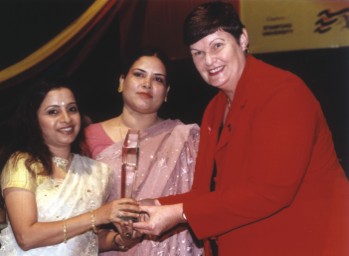|
Endeavour
Homemakers in Business
AM Amin
Women, historically unsung and unappreciated, have nevertheless shown their mettle in terms of surviving the worst odds. In recent times they have also demonstrated a keen business sense. In Bangladesh, more and more women are coming out into the market with their own products. Fashion designing especially, has become a popular field for women, particulary those who have not had the opportunity of higher education or professional careers. For homemakers especially, the huge market for fashionable wear has opened up opportunities to delve into the business of making and selling clothes. What is most encouraging is that various organisations have begun to take notice of these women and are actively supporting and promoting women entrepreneurship. Perhaps the first name that comes to mind is MIDAS, an organisation that has made the dreams of many businesswomen possible by providing them with collateral-free loans, logistical support, business counselling as well as a market for their products. BSIC (Bangladesh Small and Cottage Industries) and several private organisations have given opportunities to women to acquire the necessary skills and technical know-how to start a business and survive the fluctuations in the market and intimidating financing problems. The result of the opening of opportunities is that women are entering the business world with the simple motivation of being able to earn their own income, contribute to the family funds and most importantly, attain a sense of self-worth.

Jesmin (L) receiving the Shining Personality Award from the Australian High Commissioner and the executive director of Nari Kantha Foundation |
Take Jesmin Ahmed, a housewife who was married off when still a teenager in her hometown Comilla. While she always had a penchant for embroidery and sewing, little did she know that twenty or so years later, she would be heading a successful business in women and men's apparel. Her fashion house 'Karukaj' sells clothes to major stores in Dhaka and a couple of shops in Sylhet with orders coming in from abroad as well. Specialising mainly in traditional shalwar kameezes, fotuas and punjabis, Jesmin has also been recognised for her hard work. In 2001, Karukaj's entry won first prize in Ananya's Eid Fashion competition. The latest accolade was the Shining Personality Award 2005 from Narikantha Foundation for women entrepreneurship. The Foundation aims to create social awareness among rural and marginalised women, to make them independent. It also awards women in a wide range of fields. This year, the awards went out to around forty individuals (mostly women) and included personalities as well-known as Ferdousi Mojumdar and Kabari. It was thus especially exciting for Jesmun to be among this illustrious group. The same award was also given to another enterprising businesswoman Zabeen Noman who runs a thriving garments business that employs 1200 workers and earns around 10 million dollars per year.
Even when she was growing up in a small town and after she was married and had completed her B.A, Jesmin kept her hands busy, constantly making things, her own clothes or embroidered pillowcases and bed covers. It was something she had inherited from her mother who had a special knack for sewing. Soon a hobby became a passion and it was inevitable that she would be doing this a lot more seriously. " I started with only 15000 taka to make punjabis. I bought the material and then designed them". Jesmin hired a mother and daughter team who helped to sew the punjabis and with the help of an acquaintance in Sylhet, her first collection ended up in a store in Moulvibazar. Later she took a training course from BISIC in block and screen printing. Soon Jesmin was expanding her range making fotuas, saris and shalwar kameezes. Following current trends she designs kurtis and short kameez three pieces. Jesmin works with local as well as foreign fabrics and one of the specialties of her brand is intricate karchupi embroidery on kameezes. " I try to adopt designs according to the season and current trends". In the summer, Jesmin works with cotton and in winter with pure silk. Her clothes can be found in big stores such as One-stop Mall, Priyo and Sopura Silk Mills. When a feature on her work came out in Ananya magazine Jesmin started getting orders from as far away as Canada, US, Sri Lanka and Italy.
Karukaj's factory, located in Pallabi on the ground floor of a building employs 30 people, mostly women. Jesmin works with an additional 30 women in the Mirpur area. While Jesmin heads the business, she is assisted by her husband, son and brother-in-law. There are many women like Jesmin who, through sheer hard work and determination, have managed to obtain a niche in a market that is so competitive. While Jesmin has achieved a good deal of success in terms of profit as well as being recognised for her work she still dreams the dream of any potential designer: to establish her brand in the market.
Copyright
(R) thedailystar.net 2005
|
